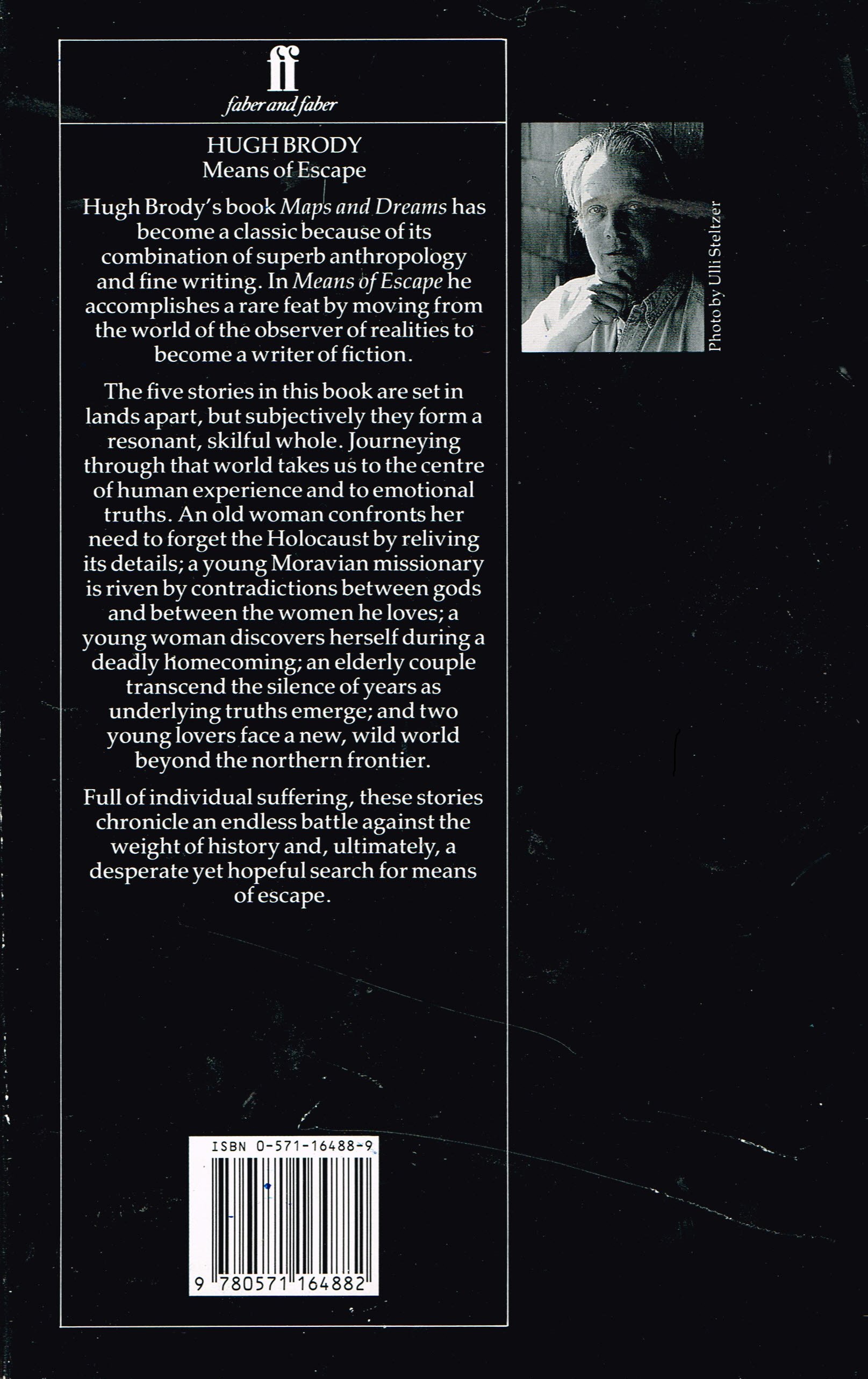Means of Escape
Paperback 192 pages
Publisher: Douglas & McIntyre (Aug. 1 1993)
Language: English
ISBN-10: 1550541080
ISBN-13: 978-1550541083
A need for place. A search for peace. A ceaseless quest, balanced by occasional respite -- physical, psychological or metaphysical. These are the preoccupations of our time, and they are fertile ground for the taut, incisive prose of an accomplished writer. With Means of Escape, internationally acclaimed anthropologist, filmmaker and writer Hugh Brody makes a brilliant fiction debut.
Reviews
"I recommend these tales to all connoisseurs of the short story, for they are unique in flavour and style, altogether unusual, and will stay in my memory like elegiac and lyrical songs or poems. Beautiful.” —Doris Lessing
"Intense, deeply felt, charged fiction...A masterful accomplishment.” —M. T. Kelly
"Brody compels you to witness the havoc that emotional damage wreaks, compellingly, movingly, with no quarter given." —Penny Perrick, Sunday Times
Full Review by James Murray-White
Means Of Escape is a vivid collection of short stories from noted anthropologist and filmmaker Hugh Brody. The five stories all explore loose themes of isolation and a sense of being trapped: all the central characters in some way are searching for some kind of escape, from the physical or psychological torment that is pursuing them.
This manifests for a young missionary in the story Eva as tension between the doctrine of his faith and the reality of the Inuit people who live by their own social and spiritual codes, as he attempts to proselytise to them. He is emotionally unprepared for life in the High Arctic, and is betrayed by his religious masters. Brody draws upon his many years of experience amongst Inuit culture (for which he is a highly respected writer, anthropologist and academic) to create many worlds and realities within several communities in this story. He skilfully juxtaposes the past and present in the telling, which weaves a sense of foreboding and disaster from the start.
Island is also a powerfully told story, written with more immediacy, and also a clever device of a "story within a story" that made me re-read and question the plot I had read so far. The story starts with an external narrator, and then views the action from Marianne’s point of view. Marianne visits her parents, Ysobel and George, who live on an island off the British coast, and sinks into their world of bitterness, regret, and manipulation. It is a cloying world, into which the parents have retreated: “Ysobel’s voice was suddenly childlike. “I belong at the edge. With the Roman army! I may not write, but I’m a writer. My image of myself. Anyway, we couldn’t afford to live anywhere else. Realism dictates.” As with the Eva story, the indigenous locals in Island also suffer at the hands of the incomers. Incendiary activism provides an explosive end to this angry story.
The stories Family Trees and The Lake both deal with Holocaust themes: dealing with memories and uncovering memories, and all that can come up from the uncovering. In The Lake a wife’s wartime experience is suddenly revealed to a husband after 50 years of being hidden. This is wistful writing at its best. Again, Brody shows great style in contrasting the raw experience of three young Jewish women on the run in central Asia with the inner reflections of an elderly husband travelling in Germany with his wife, who has not returned since she fled the war: “I thought: I am discovering whom I have been married to for half a century. I thought: when it comes to love, we English are nothing if not tentative. 45 years of discretion.”
In contrast, the character of Aunt Sonia in Family Trees goes through a rapid uncovering of memories, which cause the first person narrator to genuflect upon human society with all its despair and failings. The theme of needing to find the means of escaping from the vicious cycle of human hatred, rather than allow it to perpetuate in each new generation, is very clear here.
The final story, Wolf, is an increasingly gory dialogue between a young couple, John and Nina, holed up in a cabin somewhere, telling stories in the dark that blur the boundaries between the real and the imaginary. It is the most Beckett-like of the stories, and oddly the most cinematic, due to its mingling of dialogue in the dark with rich visual imagery, and its hint of vulnerability and terror.
Brody is a powerful, sensitive writer, who is loud and clear in his telling of stories, and artful in their creation and execution. All the stories here are strong and vibrant. In his acknowledgements, Brody writes “fiction is not, of course, an escape.” In using this genre, as well as his anthropological writings and film, the voice for deep examination of self and society comes through, as well as a call for change. This collection, which was published in 1991 and is sadly quite hard to find (thank you to the bookshops of Hay-on-Wye for finding me a copy) is a valuable contribution to the vast genre and archive of short stories. I hope for more from him.




